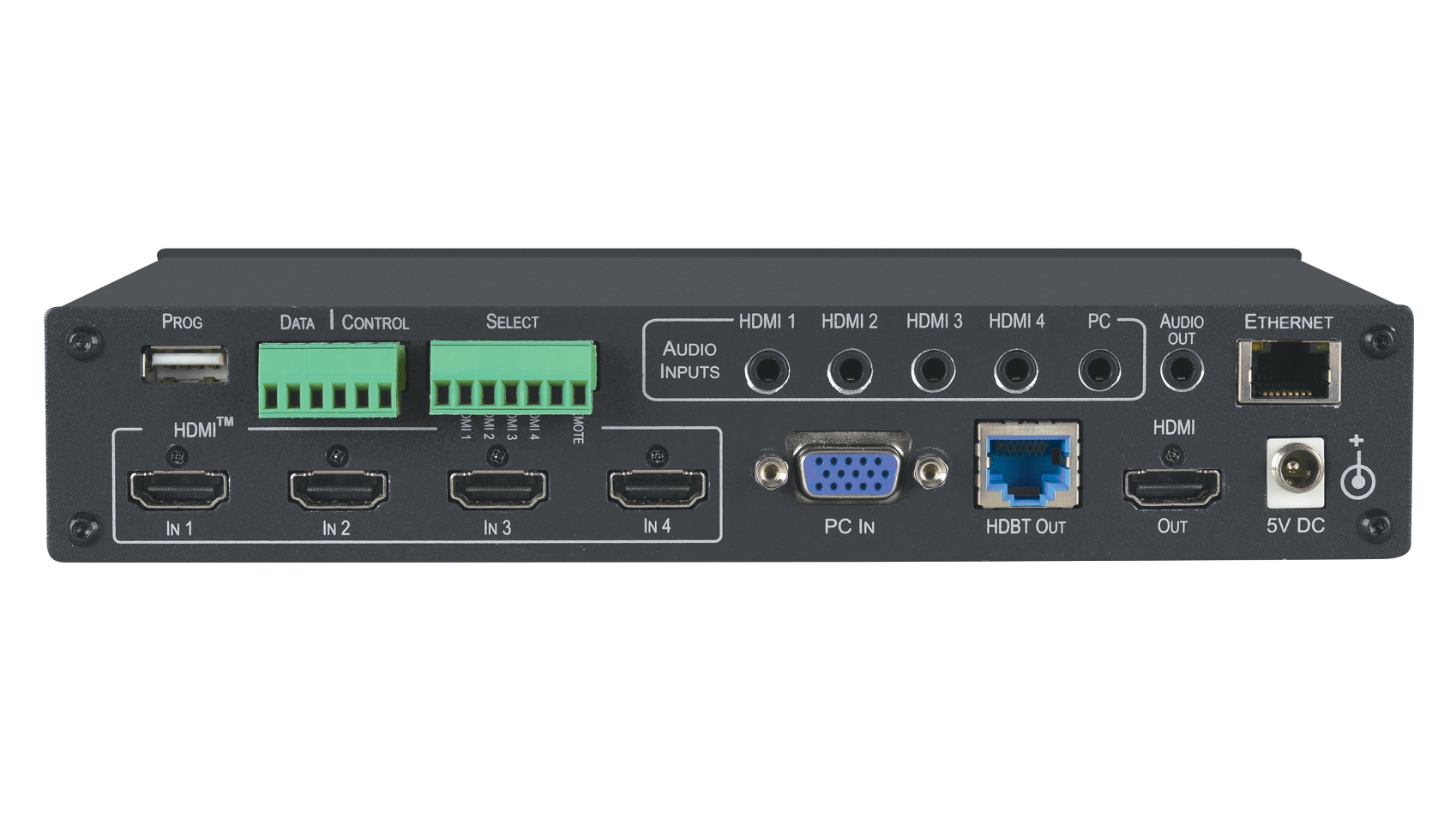At first glance, the Kramer VP-440X appears no different from any standard switcher, but I didn’t need to work with it for long to realize its potential. Its compact size, versatility, features, and ease of use—all in a half-rack footprint and at a very reasonable cost—set this product apart.
The VP-440X’s size makes it easy to install in small racks, under tables, behind displays, and more. It’s unfortunate that the rack mount kit is not included. If all equipment like this included a rack mount kit, installers wouldn’t have to remember two part numbers and pay additional costs.
Its size does not limit the number of available ports. I had four digital HDMI inputs and one HDMI output capable of 4K 60 4:4:4. I am always skeptical of this statistic, but it proved to be true when I tested with Quantum Data. In addition to the digital inputs, it has one VGA input—for versatility, and for those who haven’t updated their laptop in a decade. There’s also a HDBaseT output. It’s not a matrixed output, and it mirrors the HDMI, but it worked for my situation.

[ The Integration Guide to AVoIP ]
The Kramer VP-440X is more than a switcher; it’s a scaler, too. Scalers are overlooked far too often in basic designs, and they’re an important tool in signal distribution, as we all know. This scaler is versatile and allows for upscaling, cross-scaling, downscaling, or native passing of the displays.
One of my favorite features of this unit is the audio. Many small HDMI switchers and scalers only work in the digital world, but this one allows audio embedding and de-embedding. There is a digital signal processor that will do equalization, mixing, source audio selection, and even microphone mixing. Applications I would use this for would most likely not require the microphone feature, but others may find that feature very useful. The ability to digitally process the audio and microphone is a handy tool.
The only fault I found with this product relates to the physical input; I’m not a fan of the microphone input being on the front. To be fair, there is not much room left on the VP-440X’s rear without expanding it to a full rack width. This device’s primary appeal is its size, and since the microphone is most likely not the most commonly used feature, putting it on the front makes sense.

The VP-440X has all the typical features you would expect, including HDCP, HDR, and EDID pass-through. Third-party control is no problem via RS-232, IP, or even contact closure. Control of the display is even possible via CEC, which can also be triggered via the control commands.
This device from Kramer offers much more than a standard switcher/scaler, and at a reasonable cost. It is rich with features, has versatile installation options, and is easy to use and set up. Smooth constant sync switching brings a more naturally acceptable switching to any application in the classroom, boardroom, church, or other facility type.
Jeremy Caldera, CTS-D, CTS-I is an expert in the professional audiovisual industry with over 25 years of experience. Currently senior vice president at Pearl Technology, a leader in AV and IT services based in Peoria, IL, Caldera specializes in the planning and design of audiovisual systems, organizational management, employee motivation, and the development of corporate standards and business growth strategies. Caldera sits on the academic advisory board for the Audio Arts & Acoustics Department of Columbia College Chicago, is the former AVIXA CTS certification program chair, and is a recent inductee to the SCN Hall of Fame. Caldera is also a partner at BNCO Consulting and Top Shelf Digital Media. Connect with him on LinkedIn: www.linkedin.com/in/jwcaldera
Related Kramer News
Finding the Heart of Your Network • When looking at AV systems that encompass multiple sources and destinations, routers and switchers often serve as the heart of the network. With that in mind, working with the right technology provider to identify what your system really needs can make or break your network installation.
The Integration Guide to AVoIP • With more people becoming comfortable with the idea of AVoIP networks and the associated costs of AVoIP installations coming down, systems contractors will be having more conversations about AVoIP with their clients. However, clients must understand that while AVoIP may be a practical choice for projects with a ton of channel counts and many interconnected spaces, it’s not necessarily the best option for simpler, more straightforward designs.
How AV/IT Data Is Helping to Plan for Hybrid Futures • With all of the question marks these days surrounding future space needs, insights from your AV/IT deployments could prove more valuable than ever before.

